高中英语 Book 4 Module 3 cultural corner课件
文档属性
| 名称 | 高中英语 Book 4 Module 3 cultural corner课件 |  | |
| 格式 | zip | ||
| 文件大小 | 110.9KB | ||
| 资源类型 | 教案 | ||
| 版本资源 | 外研版 | ||
| 科目 | 英语 | ||
| 更新时间 | 2012-11-25 20:58:49 | ||
图片预览



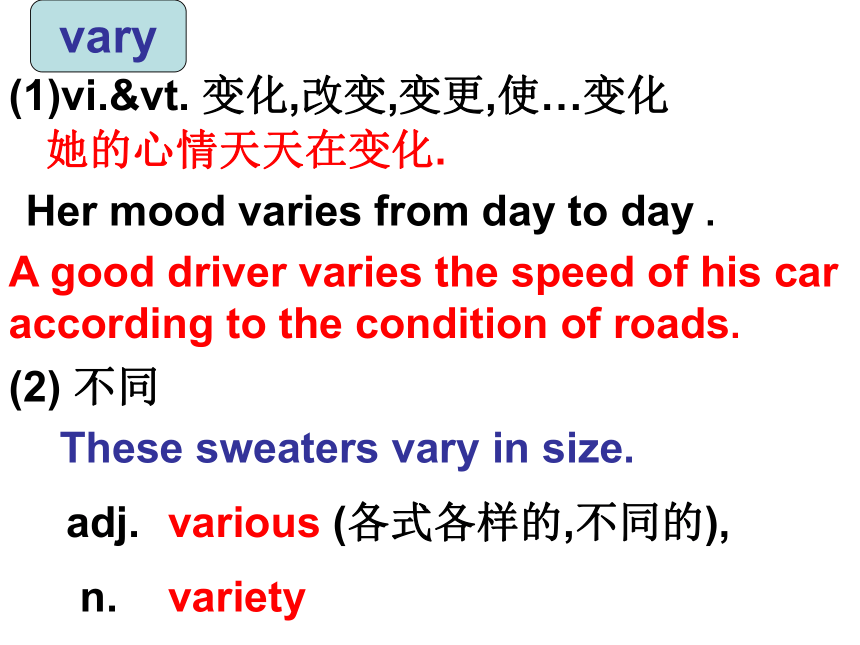


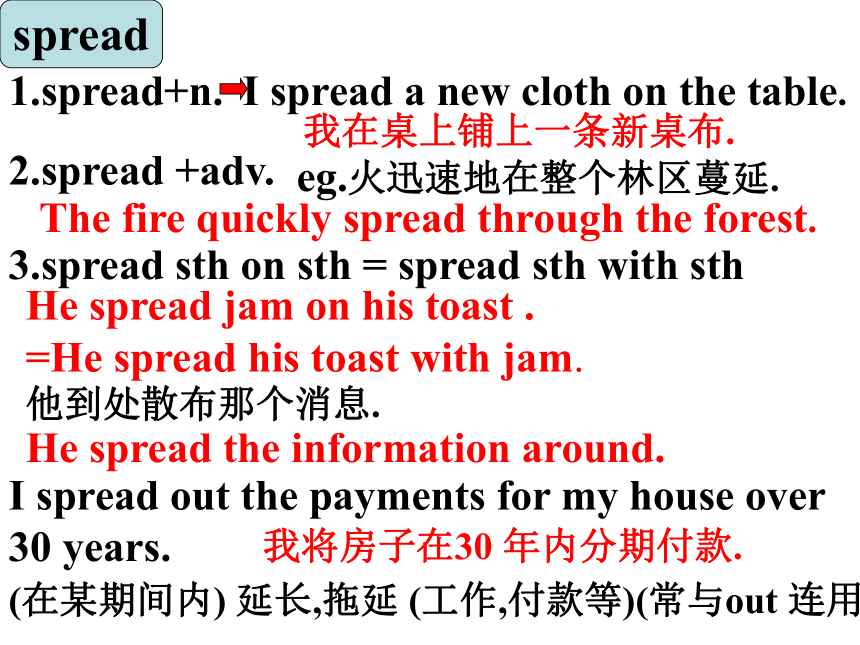
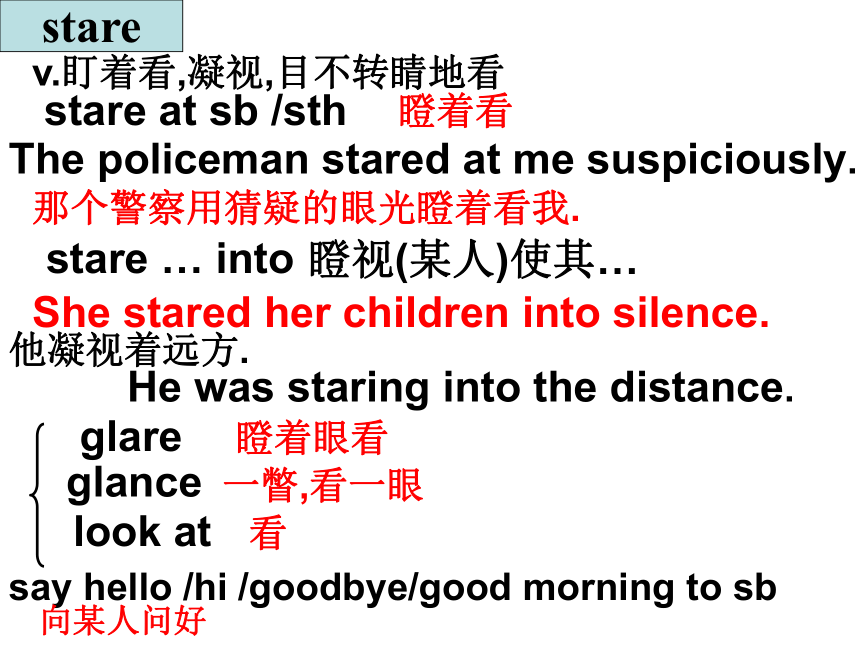
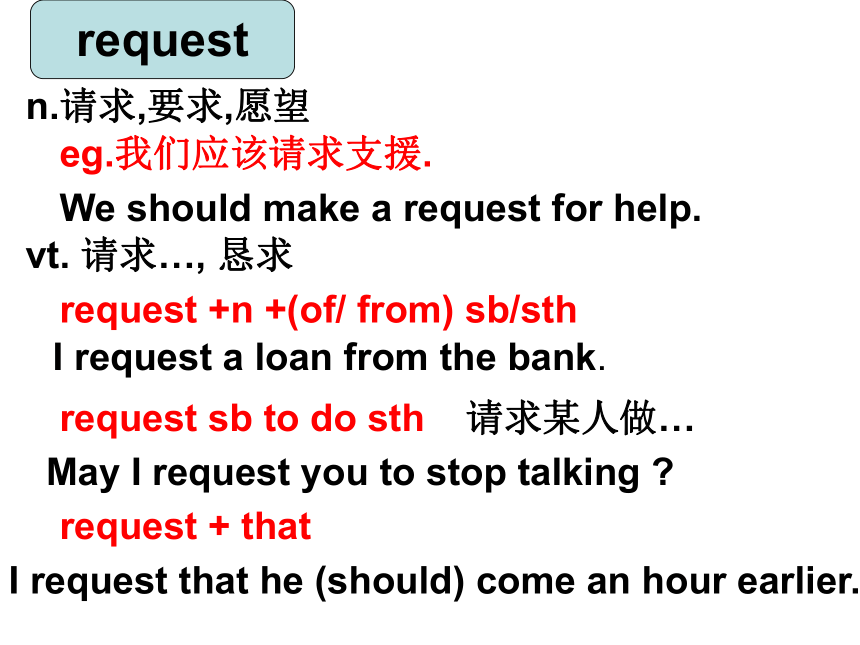
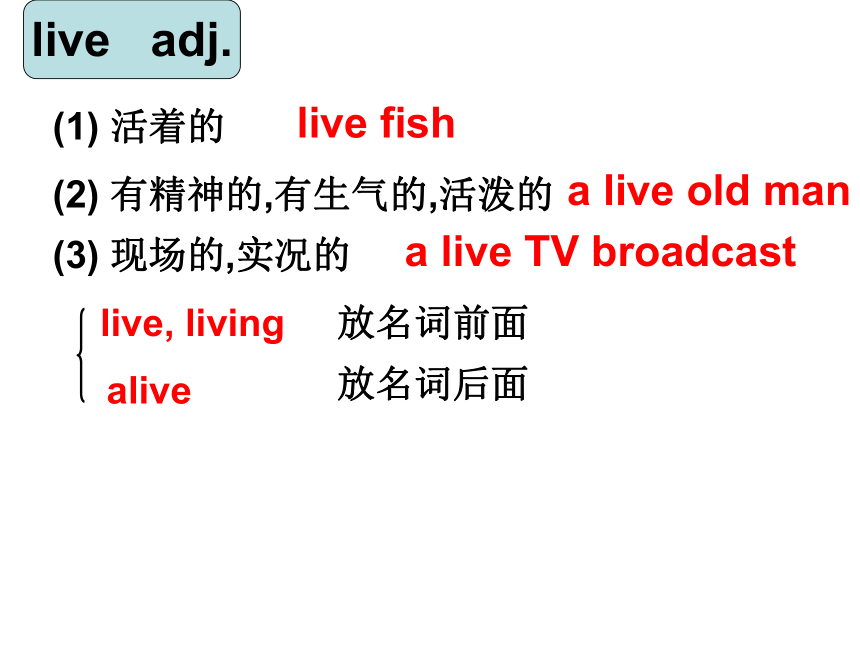
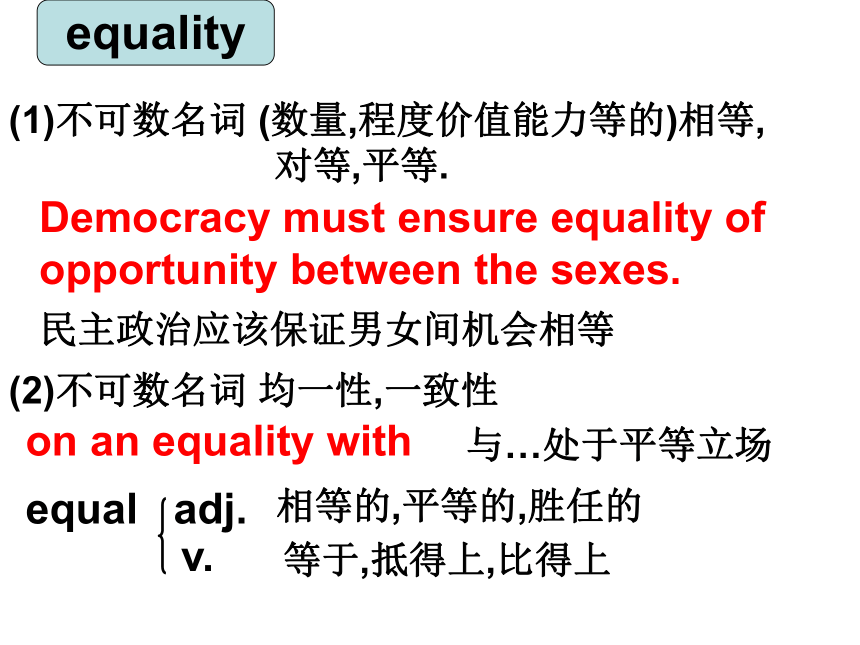
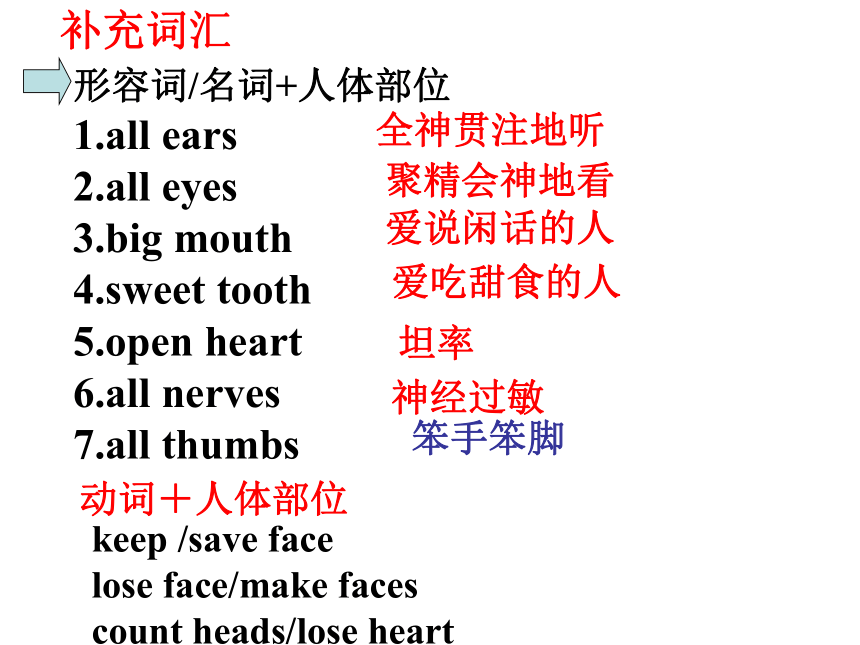
文档简介
课件31张PPT。Body Language and Non-verbal Communication V.(1) vt. 传达,传送,通知.communicate sth. to sb.eg. He communicated his intention to me. 他把他的意向告诉我.(2) vi.(用语言,信号)传递信息;交流;(与…)通信eg .我们用书信彼此联络We communicate with each other by
letters.1.communicate
Word study(1) [U] 传达,交流,沟通,交换情报,通信Language is a major means of communication,
but communication between people who speak
different language is difficult.虽然语言是主要的交际工具,但语言不同的人之间
的沟通却很困难.(2) [C] 讯息,情报This communication is classified.(3) (通常用复数形式) 通讯设施eg.大城市通常有完备的通讯网Big cities usually have excellent communications.n. communication(1)vi.&vt. 变化,改变,变更,使…变化Her mood varies from day to day .她的心情天天在变化.A good driver varies the speed of his car
according to the condition of roads.(2) 不同These sweaters vary in size.adj.various (各式各样的,不同的),n.varietyvary(1) vt. 分配… (常与out 连用) You must deal out the money fairly.搭配: deal in 买卖,经营deal in antiques古董deal with
1)对待,处理.他很了解如何与小孩相处.He knows well how to deal with children.We have dealt with that store for 10 years.2)与…交易 (无被动语态)
deal
(2) n. 交易,协议.他和那个人交易.He made a deal with that man.a great /good deal 很多,大量,非常地a great deal of很多的,大量的(1) vt. 把(某人)卷入(事件等之中),连累,牵涉involve + 名+in +名不要把我卷入你们的争吵.Don’t involve me in your quarrel.(2) vt. 包含… ,附带…,需要…,意味着…Winning the game involves both skill and
fortune.involvespread1.spread+n. I spread a new cloth on the table.我在桌上铺上一条新桌布.2.spread +adv.eg.火迅速地在整个林区蔓延.The fire quickly spread through the forest.3.spread sth on sth = spread sth with sth他到处散布那个消息.He spread jam on his toast .
=He spread his toast with jam.He spread the information around.I spread out the payments for my house over 30 years.我将房子在30 年内分期付款.(在某期间内) 延长,拖延 (工作,付款等)(常与out 连用)v.盯着看,凝视,目不转睛地看stare at sb /sth 瞪着看The policeman stared at me suspiciously.那个警察用猜疑的眼光瞪着看我.stare … into瞪视(某人)使其…She stared her children into silence.他凝视着远方.He was staring into the distance.glare 瞪着眼看glance 一瞥,看一眼look at 看say hello /hi /goodbye/good morning to sb向某人问好starerequestn.请求,要求,愿望eg.我们应该请求支援.We should make a request for help.vt. 请求…, 恳求request +n +(of/ from) sb/sthI request a loan from the bank.request sb to do sth 请求某人做…May I request you to stop talking ?request + that I request that he (should) come an hour earlier.
live adj.
(1) 活着的live fish(2) 有精神的,有生气的,活泼的a live old man(3) 现场的,实况的a live TV broadcastlive, living放名词前面alive放名词后面equality不可数名词 (数量,程度价值能力等的)相等,
对等,平等.Democracy must ensure equality of opportunity between the sexes.民主政治应该保证男女间机会相等(2)不可数名词 均一性,一致性on an equality with 与…处于平等立场equal adj. 相等的,平等的,胜任的v.等于,抵得上,比得上补充词汇形容词/名词+人体部位
1.all ears
2.all eyes
3.big mouth
4.sweet tooth
5.open heart
6.all nerves
7.all thumbs动词+人体部位keep /save face
lose face/make faces
count heads/lose heart 全神贯注地听聚精会神地看爱说闲话的人爱吃甜食的人坦率神经过敏笨手笨脚face to face
heart to heart
eye to eye
hand in hand
neck and neck
side by side
shoulders to shoulders
head to head
back to back
arm in arm面对面
交心
赞同
手拉手
并驾齐驱
肩并肩
齐头并进
交头接耳
背靠背
手挽手Body language
shake hands
headwave
smilePoint
Arms crossed on chest
Hand to cheek
Cross one’s legs nodhug
bow
bendIntroduction1. exchange information, news, ideas, etc 2. knowing what is going on around one,
awake, aware or noticing 3. (of people or animals ),ready to attack;
offensive; quarrelsome 4. expressive movement of a part of the body,
esp the hand or head 5.make a threat or threats against sb ; try to
influence sb by threats vary conscious communicate gesture
traditionally weapon aggressive
threatening slightly deal involve6.include or affect (sb/ sth) in its operation;
cause sb / sth to take part in an activity or
situation communicateconsciousaggressivegesturethreateninginvolve1.extend the surface area, width or length
of sth by unfolding it 2. particular system of faith and worship
based on such a belief 3. request to go or somewhere or do sth
in a friendly way 4. act of kindness beyond what is due or usual 5.decision of a law court or judge .6. person who performs in front of an audience 7. state of being equal youth forehead spread religion stare panic request live invitation favour host performer judgment prolong equalityspreadreligion favourjudgmentperformerequalityconcerning the organization of and relations
between people and communities 2. quickly influencing others; likely to spread
to others 3. ceremony of burying or burning dead people 4.be different in size ,volume, strength, etc5.following accepted rules of behavior6.agreement , esp in business, on certain
terms for buying or doing sth7.put the arms round (sb/ sth) tightly, esp to
show lovehug infectious social vary funeral request formal deal blank switchsocialinfectiousfuneralvaryformaldealhug look (at sb/ sth) with the eyes wide open
on a fixed gaze2. sudden irrational feeling of great fear3. out of asking for sth in speech or writing ,
esp politely
4. the way you are sitting or standing
5. not conscious, insensiblerequest panic stare unconscious
classical position switch toaststarepanicrequestpositionunconsciousTrue or FalseWe communicate with only words and
sentences.2.Every culture has developed a formal
way to greet strangers.3.Greetings in African countries do not
Involve touching the other person.4.” Give me five ”is quite a common
greetings.5. People give away much more by their
words than by their gestures.6.Body language is more communicate
than spoken or written language.FTF TFTPhrases 1.想到
2.不只是,远甚于
3.口语/书面语
4.身体姿态
5.”习得的”身势语
6.和… 不同
7.保持警惕,心存戒备
8.正规的方式
9.握手
10.忙着做某事think of more than spoken words/written wordsbody position“learned” body language vary from sthbe on guardformal wayshake handsbe busy doing sth /be busy with11.双手交叉
12.恭敬地鞠躬
14.非正式场合
15.信任的姿势
16”击掌”
17.举起手
18.五指向外
19.暴露
20.能猜出别人心思的人join one’s hands bow one’s head in respectinformal stylea gesture of trust“Give me five”hold up one’s handfive fingers spreadgive away a mind readerRetell the passage If you say the word “communicate ”, most people
______ ___ (想到)words and sentences.
Although these are important, we _____________
__________________________________________
(但我们并不只是通过口头和书面语言交流).
Indeed, body positions are part of
__________________________(我们所称的身体语)
We see examples of ___________ body langue
very often, yet there is also ________ body
language,_______________________________
(在不同的文化中各不相同).think ofcommunicatewith more than just spoken and written words.
what we called “body language”.unconscious“learned”which varies from culture to culture.We use “learned” body language when we ______
_________ ___ (被介绍) strangers. Like other
animals, We ___ __ ______ ( 保持警觉)until we
know it is safe to relax. So every culture has______
__ _____ ____(形成一种正规的方式) to greet
strangers, to show them we are not _________
( 具有侵犯形象).Traditionally, Europeans and
Americans If our right hand_ ____ _____ ______
(忙着与人打招呼), it cannot be holding a weapon.
We shake hands when we _____ _ ____(做交易).
It means, “We agree and we trust each other.” introducedtoare on guardaredevelopeda formal way
aggressiveis busy greeting someonemake a dealGreetings in Asian countries __ ___ ______ _______
(不接触) the other person. Hindus _____their hands
and _____ their heads ___ ______ (恭敬地鞠躬).do not involve touchingjoinbowin respect American youths often greet each other ___ ____
________ (说着), “Give me five!” One person then
______ __ ___ ______(举起手),palm _______
and five fingers spread. The other person ______
____ _____ and ______ other’s open hand _____
the head in a “high five”. with theexpressionholds up his handsoutwardsraiseshis handslapsover People _____ _____ (暴露)much more by their
Gestures than their words. Look at your friends
and see if you are ___ _______ _______
(能猜出别人心思的人)!give awaya mind readerLanguage points
1. In all of these examples, the hands are busy with
the greeting and cannot hold a weapon.be busy with sth = be busy doing sth 忙于…Eg. She was busy with her homework.Hold1.”拿着,握着”hold the money tightly2.” 容纳,充满”The hall can hold more than 500 people.3. “支撑住/支持住…的压力”那座桥不能负载那样的重量That bridge can’t hold that much weight.Hold up 举起,拿起Eg. I held up my hand to show that I had a question.Hold back制止,阻止,隐瞒人们建大坝来阻止上涨的洪水.People built the dam to hold back the rising flood.Hold on 继续,持续暴风雨持续了一晚上The storm held on all night.How longer can we hold on ?坚持下去Hold on a minute/Hold on, please.2.People give away much more by their gestures
than by their words.give away “暴露,泄露”Eg. He is sure to give away your secret.“赠送,免费给与”Eg. He give all his lands away to the city.give off
give out
give in
give up发出,散发分配,分发屈服放弃,戒除Practice
1.They shake hands when they ______.
wipeout B. make a deal
C. make a toast D. make a sip
2.Greetings with hands ____ mean the two
speakers are not _____.
A. involving…informal B. involved…formal
C. involving…aggressive D. involved…aggressive
3. Don’t talk about that at the beginning of the
story, or it may ___ the surprising ending.
A. give away B. give out
C. give up D. give off4.Having a car ____ my cost of every month.
Sometimes I can’t make ends meet.
(Which of the following is wrong?)
A. adds up to B. raises
C. adds to D. increases
5.____ ___ __ __ ___ ______ (你能帮帮我) and turn off the light ?
6.____ you decide to take up , you should try to make it success.
If only B. Unless C. Whenever D. Whatever
7.-Do you think we can get there on time ?
-Yes, ____ the truck doesn’t break down.
A. Even if B. unless C. until D. so long as
Could you do me a favourCultural CornerRead the passage and answer the question1.Why do people clap?
2.When do people clap in China?
3.What are the clapping's characters?Phrases
1.无论他们多么好
2.现场表演
3.互相竞争
4.容纳14,000人
5.成年男人
6.造成很多噪音
7…标记/符号
8.把…加到…
9.用另一种方式
10.在婚礼上 however good they area live performancein competition with each otherhold 14,ooo peopleadult male populationmake a lot of noisea sign ofadd … to in another way at a wedding
letters.1.communicate
Word study(1) [U] 传达,交流,沟通,交换情报,通信Language is a major means of communication,
but communication between people who speak
different language is difficult.虽然语言是主要的交际工具,但语言不同的人之间
的沟通却很困难.(2) [C] 讯息,情报This communication is classified.(3) (通常用复数形式) 通讯设施eg.大城市通常有完备的通讯网Big cities usually have excellent communications.n. communication(1)vi.&vt. 变化,改变,变更,使…变化Her mood varies from day to day .她的心情天天在变化.A good driver varies the speed of his car
according to the condition of roads.(2) 不同These sweaters vary in size.adj.various (各式各样的,不同的),n.varietyvary(1) vt. 分配… (常与out 连用) You must deal out the money fairly.搭配: deal in 买卖,经营deal in antiques古董deal with
1)对待,处理.他很了解如何与小孩相处.He knows well how to deal with children.We have dealt with that store for 10 years.2)与…交易 (无被动语态)
deal
(2) n. 交易,协议.他和那个人交易.He made a deal with that man.a great /good deal 很多,大量,非常地a great deal of很多的,大量的(1) vt. 把(某人)卷入(事件等之中),连累,牵涉involve + 名+in +名不要把我卷入你们的争吵.Don’t involve me in your quarrel.(2) vt. 包含… ,附带…,需要…,意味着…Winning the game involves both skill and
fortune.involvespread1.spread+n. I spread a new cloth on the table.我在桌上铺上一条新桌布.2.spread +adv.eg.火迅速地在整个林区蔓延.The fire quickly spread through the forest.3.spread sth on sth = spread sth with sth他到处散布那个消息.He spread jam on his toast .
=He spread his toast with jam.He spread the information around.I spread out the payments for my house over 30 years.我将房子在30 年内分期付款.(在某期间内) 延长,拖延 (工作,付款等)(常与out 连用)v.盯着看,凝视,目不转睛地看stare at sb /sth 瞪着看The policeman stared at me suspiciously.那个警察用猜疑的眼光瞪着看我.stare … into瞪视(某人)使其…She stared her children into silence.他凝视着远方.He was staring into the distance.glare 瞪着眼看glance 一瞥,看一眼look at 看say hello /hi /goodbye/good morning to sb向某人问好starerequestn.请求,要求,愿望eg.我们应该请求支援.We should make a request for help.vt. 请求…, 恳求request +n +(of/ from) sb/sthI request a loan from the bank.request sb to do sth 请求某人做…May I request you to stop talking ?request + that I request that he (should) come an hour earlier.
live adj.
(1) 活着的live fish(2) 有精神的,有生气的,活泼的a live old man(3) 现场的,实况的a live TV broadcastlive, living放名词前面alive放名词后面equality不可数名词 (数量,程度价值能力等的)相等,
对等,平等.Democracy must ensure equality of opportunity between the sexes.民主政治应该保证男女间机会相等(2)不可数名词 均一性,一致性on an equality with 与…处于平等立场equal adj. 相等的,平等的,胜任的v.等于,抵得上,比得上补充词汇形容词/名词+人体部位
1.all ears
2.all eyes
3.big mouth
4.sweet tooth
5.open heart
6.all nerves
7.all thumbs动词+人体部位keep /save face
lose face/make faces
count heads/lose heart 全神贯注地听聚精会神地看爱说闲话的人爱吃甜食的人坦率神经过敏笨手笨脚face to face
heart to heart
eye to eye
hand in hand
neck and neck
side by side
shoulders to shoulders
head to head
back to back
arm in arm面对面
交心
赞同
手拉手
并驾齐驱
肩并肩
齐头并进
交头接耳
背靠背
手挽手Body language
shake hands
headwave
smilePoint
Arms crossed on chest
Hand to cheek
Cross one’s legs nodhug
bow
bendIntroduction1. exchange information, news, ideas, etc 2. knowing what is going on around one,
awake, aware or noticing 3. (of people or animals ),ready to attack;
offensive; quarrelsome 4. expressive movement of a part of the body,
esp the hand or head 5.make a threat or threats against sb ; try to
influence sb by threats vary conscious communicate gesture
traditionally weapon aggressive
threatening slightly deal involve6.include or affect (sb/ sth) in its operation;
cause sb / sth to take part in an activity or
situation communicateconsciousaggressivegesturethreateninginvolve1.extend the surface area, width or length
of sth by unfolding it 2. particular system of faith and worship
based on such a belief 3. request to go or somewhere or do sth
in a friendly way 4. act of kindness beyond what is due or usual 5.decision of a law court or judge .6. person who performs in front of an audience 7. state of being equal youth forehead spread religion stare panic request live invitation favour host performer judgment prolong equalityspreadreligion favourjudgmentperformerequalityconcerning the organization of and relations
between people and communities 2. quickly influencing others; likely to spread
to others 3. ceremony of burying or burning dead people 4.be different in size ,volume, strength, etc5.following accepted rules of behavior6.agreement , esp in business, on certain
terms for buying or doing sth7.put the arms round (sb/ sth) tightly, esp to
show lovehug infectious social vary funeral request formal deal blank switchsocialinfectiousfuneralvaryformaldealhug look (at sb/ sth) with the eyes wide open
on a fixed gaze2. sudden irrational feeling of great fear3. out of asking for sth in speech or writing ,
esp politely
4. the way you are sitting or standing
5. not conscious, insensiblerequest panic stare unconscious
classical position switch toaststarepanicrequestpositionunconsciousTrue or FalseWe communicate with only words and
sentences.2.Every culture has developed a formal
way to greet strangers.3.Greetings in African countries do not
Involve touching the other person.4.” Give me five ”is quite a common
greetings.5. People give away much more by their
words than by their gestures.6.Body language is more communicate
than spoken or written language.FTF TFTPhrases 1.想到
2.不只是,远甚于
3.口语/书面语
4.身体姿态
5.”习得的”身势语
6.和… 不同
7.保持警惕,心存戒备
8.正规的方式
9.握手
10.忙着做某事think of more than spoken words/written wordsbody position“learned” body language vary from sthbe on guardformal wayshake handsbe busy doing sth /be busy with11.双手交叉
12.恭敬地鞠躬
14.非正式场合
15.信任的姿势
16”击掌”
17.举起手
18.五指向外
19.暴露
20.能猜出别人心思的人join one’s hands bow one’s head in respectinformal stylea gesture of trust“Give me five”hold up one’s handfive fingers spreadgive away a mind readerRetell the passage If you say the word “communicate ”, most people
______ ___ (想到)words and sentences.
Although these are important, we _____________
__________________________________________
(但我们并不只是通过口头和书面语言交流).
Indeed, body positions are part of
__________________________(我们所称的身体语)
We see examples of ___________ body langue
very often, yet there is also ________ body
language,_______________________________
(在不同的文化中各不相同).think ofcommunicatewith more than just spoken and written words.
what we called “body language”.unconscious“learned”which varies from culture to culture.We use “learned” body language when we ______
_________ ___ (被介绍) strangers. Like other
animals, We ___ __ ______ ( 保持警觉)until we
know it is safe to relax. So every culture has______
__ _____ ____(形成一种正规的方式) to greet
strangers, to show them we are not _________
( 具有侵犯形象).Traditionally, Europeans and
Americans If our right hand_ ____ _____ ______
(忙着与人打招呼), it cannot be holding a weapon.
We shake hands when we _____ _ ____(做交易).
It means, “We agree and we trust each other.” introducedtoare on guardaredevelopeda formal way
aggressiveis busy greeting someonemake a dealGreetings in Asian countries __ ___ ______ _______
(不接触) the other person. Hindus _____their hands
and _____ their heads ___ ______ (恭敬地鞠躬).do not involve touchingjoinbowin respect American youths often greet each other ___ ____
________ (说着), “Give me five!” One person then
______ __ ___ ______(举起手),palm _______
and five fingers spread. The other person ______
____ _____ and ______ other’s open hand _____
the head in a “high five”. with theexpressionholds up his handsoutwardsraiseshis handslapsover People _____ _____ (暴露)much more by their
Gestures than their words. Look at your friends
and see if you are ___ _______ _______
(能猜出别人心思的人)!give awaya mind readerLanguage points
1. In all of these examples, the hands are busy with
the greeting and cannot hold a weapon.be busy with sth = be busy doing sth 忙于…Eg. She was busy with her homework.Hold1.”拿着,握着”hold the money tightly2.” 容纳,充满”The hall can hold more than 500 people.3. “支撑住/支持住…的压力”那座桥不能负载那样的重量That bridge can’t hold that much weight.Hold up 举起,拿起Eg. I held up my hand to show that I had a question.Hold back制止,阻止,隐瞒人们建大坝来阻止上涨的洪水.People built the dam to hold back the rising flood.Hold on 继续,持续暴风雨持续了一晚上The storm held on all night.How longer can we hold on ?坚持下去Hold on a minute/Hold on, please.2.People give away much more by their gestures
than by their words.give away “暴露,泄露”Eg. He is sure to give away your secret.“赠送,免费给与”Eg. He give all his lands away to the city.give off
give out
give in
give up发出,散发分配,分发屈服放弃,戒除Practice
1.They shake hands when they ______.
wipeout B. make a deal
C. make a toast D. make a sip
2.Greetings with hands ____ mean the two
speakers are not _____.
A. involving…informal B. involved…formal
C. involving…aggressive D. involved…aggressive
3. Don’t talk about that at the beginning of the
story, or it may ___ the surprising ending.
A. give away B. give out
C. give up D. give off4.Having a car ____ my cost of every month.
Sometimes I can’t make ends meet.
(Which of the following is wrong?)
A. adds up to B. raises
C. adds to D. increases
5.____ ___ __ __ ___ ______ (你能帮帮我) and turn off the light ?
6.____ you decide to take up , you should try to make it success.
If only B. Unless C. Whenever D. Whatever
7.-Do you think we can get there on time ?
-Yes, ____ the truck doesn’t break down.
A. Even if B. unless C. until D. so long as
Could you do me a favourCultural CornerRead the passage and answer the question1.Why do people clap?
2.When do people clap in China?
3.What are the clapping's characters?Phrases
1.无论他们多么好
2.现场表演
3.互相竞争
4.容纳14,000人
5.成年男人
6.造成很多噪音
7…标记/符号
8.把…加到…
9.用另一种方式
10.在婚礼上 however good they area live performancein competition with each otherhold 14,ooo peopleadult male populationmake a lot of noisea sign ofadd … to in another way at a wedding
